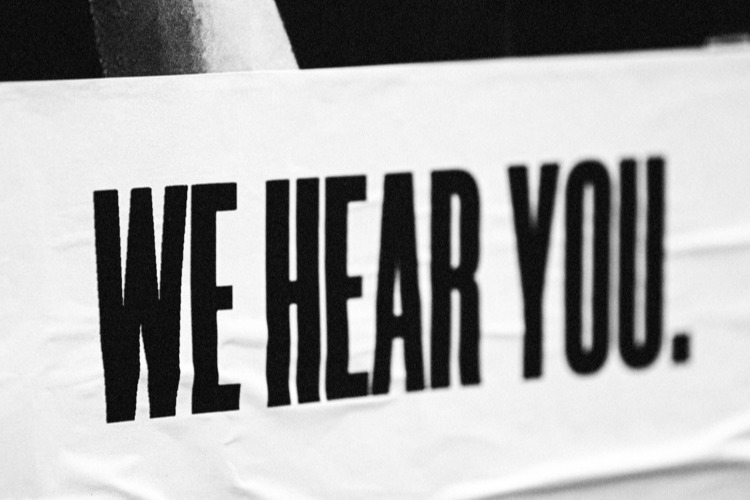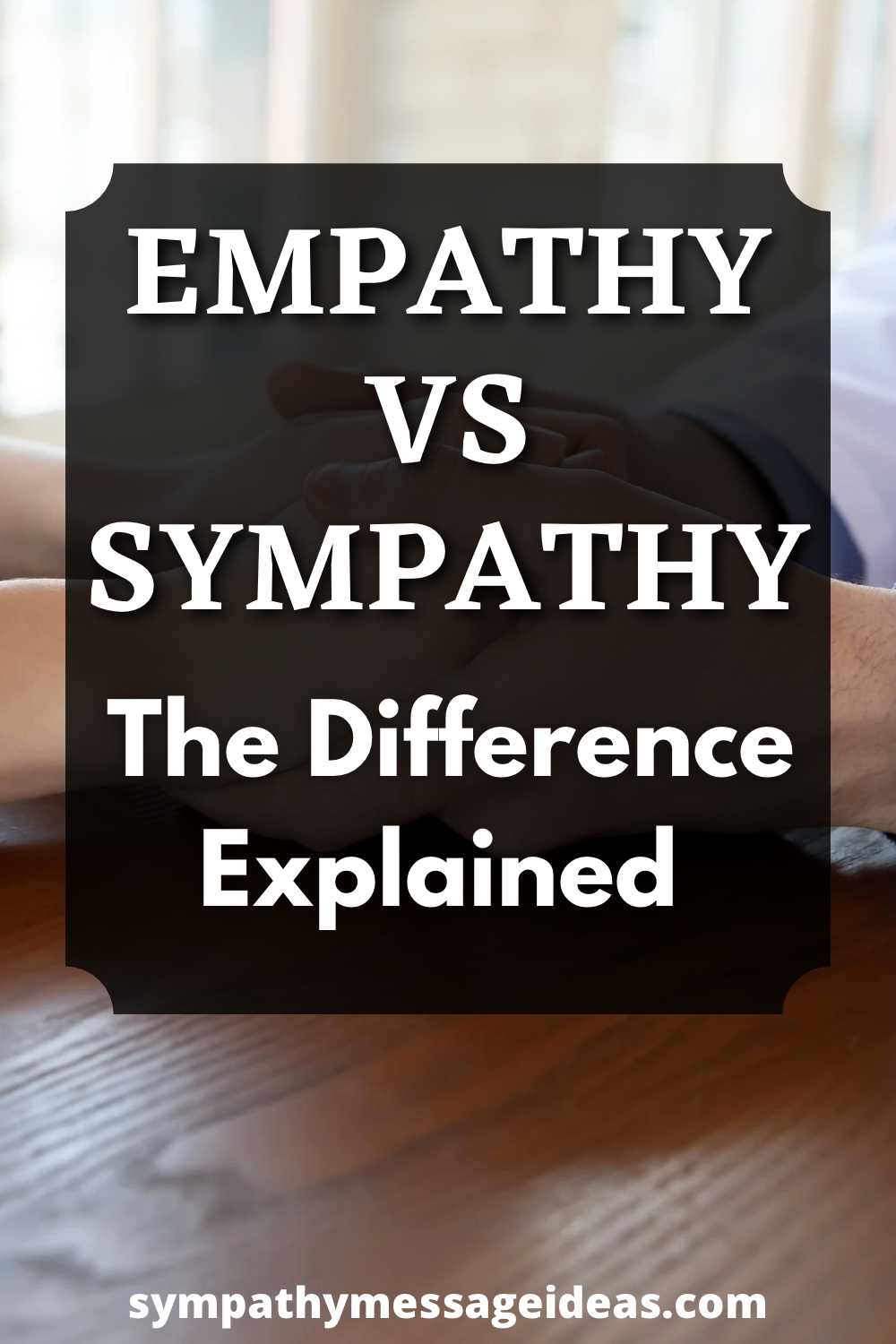When talking about bereavement and loss “sympathy” is a commonly used word. For example – “we offer or extend our sympathy to someone for their loss”.
But what exactly is sympathy? What is the difference between empathy and sympathy? And how can understanding those differences help with the way we support and are there for those grieving.
What is the Difference Between Sympathy and Empathy
The main difference between sympathy and empathy is that with empathy, you put yourself in someone else’s shoes and experience exactly what they are experiencing. You feel everything they are feeling.
The use of the word sympathy is most commonly used when people have something bad happen to them which may be unfair (though there is nothing to say that all misfortune is unfair). You regard someone with sympathy when they have experienced something tragic or upsetting and you can see how difficult it is for them.
What is Sympathy
Sympathy is the feeling of pity or sorrow for someone else’s misfortune. It can also refer to a state of partial agreement with the sentiments expressed by another, usually in an argument or debate.
Basically, it is when you feel bad for someone and want to help them out. The word is often used in response to tragic events that have happened to someone else, such as losing a loved one, illness, job loss etc.
What is Empathy
Empathy is a quality that involves the ability to understand the feelings of another or others and to share those feelings.
It is a special ability that everyone has, but some people have greater capacity for empathy than others.
Empathy is a feeling, an emotional response. So, it can be compared to other feelings such as sadness and anger, although these two do not involve emotions such as sympathy.
When to use Sympathy
You should use sympathy when you are talking about a situation where someone has been or is being badly treated.
You should also use sympathy when you need to sympathise with someone, such as someone who has experienced a loss.
If you need to offer someone your sympathy then try our selection of sympathy messages and condolences.
When to use Empathy
You should use empathy when trying to understand how another person feels.
If you want to be more empathetic, you can put yourself in the shoes of the person who has been treated badly and feel what they are feeling. This enables you to support them with whatever they are going through.
The more empathetic you become the better you will get at helping those suffering and being able to offer them support or assistance, hopefully improving their situation or mood.
It can be daunting to first show empathy. Like many things for some people it requires work.
The key is to seeing the world from other peoples perspective. This something you can work on.
Why Sympathy is Important
Sympathy is important because it means you can understand what someone is feeling and know that they are hurting or suffering because of it. On top of that it not only means you understand it but you feel their pain or hurt.
Often it’s expressed as a means of saying sorry to someone. Sorry for their loss or sorry for a situation they’ve encountered.
With sympathy though you are somewhat detached. In comparison to empathy whereby you put yourself in the persons shoes and understand what they are going through sympathy doesn’t require that.
Sympathy is just an acknowledgment of something bad rather than an understanding of it.
Why Empathy is Important
Empathy is important because it allows us to see other peoples perspective. We can put ourselves in their position and try to understand what they may be thinking or feeling.
Without empathy we wouldn’t be able to understand what others are going through and be there for them. You need to be able to relate to people to form connections and bonds. Otherwise you’re just a selfish individual who thinks only of themselves.
A lack of empathy is likely to result in you finding it hard to connect with people or maintain relationships.
Sympathy Examples
The most obvious example of sympathy is after a loss. We feel sympathy for someone who has lost a loved one.
But loss can take many forms:
- When someone is ill
- The loss of a job
- The breakdown of a relationship
- Loss of of valuables (car being stolen, losing a treasured item etc)
Really any situation where someone feels bad or has been hard done by we often feel sympathy towards.
Empathy Examples
Empathy is taking sympathy a step further. When you empathize with someone you often take on the hurt and emotions they are experiencing.
You may try to offer solutions to the problem or offer your support in different ways. That might be spending time with them, listening, helping with an activity etc.
Empathy involves a lot more action than sympathy.
Some examples of empathy:
- A friends breakup – even if you found your friends partner awful, didn’t like them and thought they were the completely wrong for each other being a friend and having empathy means you set aside your dislike for their partner and offer comfort to them. They are upset and need a friend for support and you make time to listen and be there for them, understanding that even though you didn’t approve of their partner they are still sad the relationship has ended.
- Grief after a loss – having sympathy after someone loses a loved one is natural for most people. But demonstrating empathy would be understanding what it’s like to grieve and be in pain after that loss. You use that understanding to be there for whoever it is grieving, offering the support they need through listening, kind words or any help they might need.
- If a friend or colleague is forced to work on a weekend you could stop by for some company or with their favorite snack. You’re doing more than just feeling sorry for them, you’re empathizing with the fact that working on a weekend isn’t fun and knowing that having a friend come by to cheer you up or for company is going to make them feel better.
Can Empathy be Developed or Taught?
Yes, you can develop empathy and improve your emotional intelligence. Most learn or are taught to be empathetic as a child but you can still learn to increase your empathy as an adult.
It isn’t easy though. It requires hard work and getting outside of your comfort zone. Understanding others perspective is key which means putting yourself in their shoes.
To do this you can:
- Listen – just listen to everyone. Hear what they are saying, pay attention and think about what it is they experience or feel.
- Volunteer – this will have you interact with and get to know a wide range of different people from different walks of life. It will also expose you to those with different life experiences to yourself.
- Talk to new people – but do more than just small talk. Ask proper questions and show interest in their lives. Learn about them and what they think.
- Work with others – being part of a project and working with people will help you to understand the better and become more in tune with how other people and feel.
- Read books – it’s proven that reading fiction helps people to become immersed in other worlds and peoples lives, even if they’re not real. This again helps to understand others feelings and thoughts and put yourself in their position.
- Do Research – documentaries and articles, be it in papers, magazines or online expands your mind and let’s you learn of others experiences.
Resources
For more help on understanding empathy and sympathy as well as how to learning it and why try these websites:
- Understanding Empathy – Simon Sinek
- How to be More Empathetic
- 7 Keys to Learning How to Empathize
- Developing Empathy: 8 Strategies
Conclusion
Sympathy and empathy are both extremely important but also very different. Knowing and understanding those differences and how you should use both will help you to have better relationships and people will appreciate you’re emotional intelligence.
Hopefully you now understand the differences between empathy and sympathy and will feel more comfortable using them.



